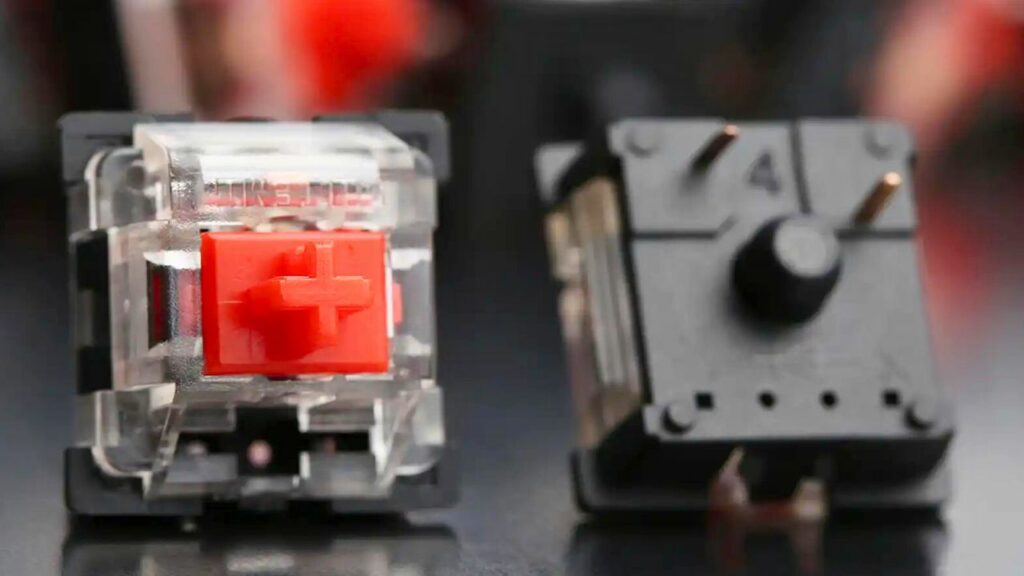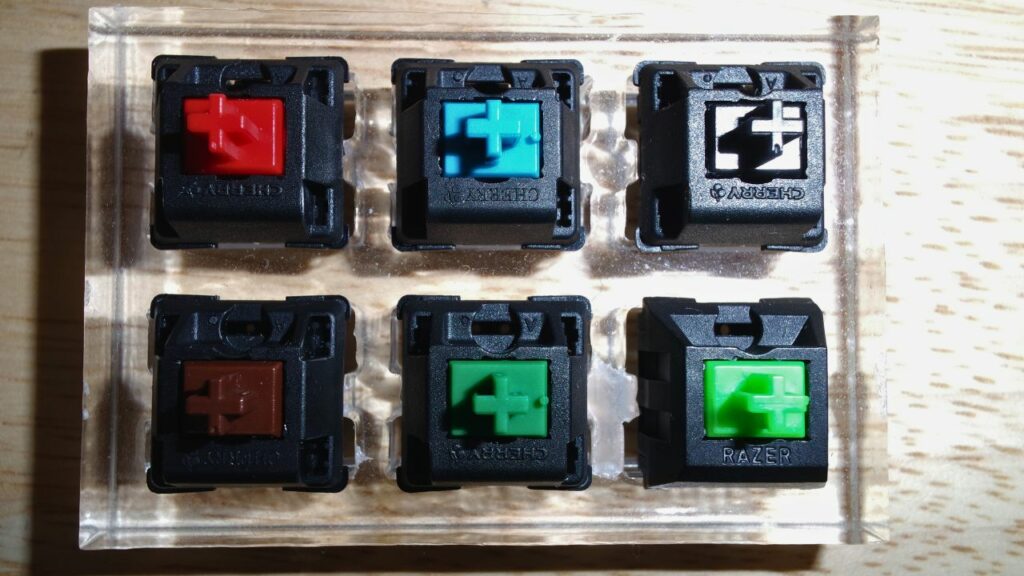
As a mechanical keyboard enthusiast or perhaps someone simply looking to spruce up your typing or gaming experience, you may have come across Outemu switches. While they might not be as renowned as the Cherry MX switches, Outemu switches have made their own corner in the market for being a reliable and pocket-friendly option. But are they really any good? Let’s dive in.
Outemu: An Affordable Cherry Clone
Outemu switches originated in China after the patent for Cherry MX switches expired. They serve as an affordable alternative for those seeking the tactile feedback and sound synonymous with mechanical keyboards but at a more cost-friendly price. If you’re looking for a budget keyboard, you might find Outemu switches under the keys, offering a nice bang for your buck, albeit with some tradeoffs.
The Colorful World of Outemu Switches
What I find particularly interesting about Outemu switches is the range of choices available. Each color variant – Blue, Brown, Black, and Red – offers unique characteristics, tailoring to different user needs and preferences.
The Outemu Blue switch is clicky and requires an operating force of 60 cN. For the home user, especially those with a heavy-handed typing style, it could be an ideal option. However, if you have smaller hands or a lighter touch (like me), you might find it slightly more challenging to use. Moreover, the Blue’s distinctive tactile and clicky properties make it less ideal for intense gaming sessions.
The Outemu Brown switch, on the other hand, is a jack of all trades. It’s tactile with an operating force of 55 cN, and it works fairly well for both typing and gaming. Beware, though, it can get noisy if you’re an emphatic typist, and the bump might be a tad too much for those with a softer touch.
Outemu’s Red switch comes in with a lighter operating force of 50 cN. It’s a linear switch, making it an excellent choice for office environments due to its quiet operation. Personally, I’ve found it suitable for people who type lightly, and it’s also a favorite among the gaming community due to its quick actuation.
Lastly, we have the Outemu Black switch, also a linear one, but with a heavier operating force of 65 cN. This switch might be perfect for office use as well, thanks to its silent operation, and is quite forgiving of heavy-handed typists or those with larger hands. As a bonus, it performs admirably for gaming due to its consistent response and spring heaviness that prevents bottoming out when typing or gaming at a fast pace.
Outemu Switches vs. the Competition

While Outemu switches are undeniably affordable, it’s crucial to acknowledge the competition. Gateron switches, for instance, are known to be smoother and quieter, and their durability and performance often outshine Outemu. But where the Outemu switches truly shine is in their affordability, making them a top choice for Cherry MX clones.
An added bonus? If you’re a fan of Cherry MX keycaps, they can be used on Outemu switches as well, thanks to their similar designs.
Pros and Cons of Outemu Switches
Before you jump on the Outemu bandwagon, let’s consider their pros and cons. On the plus side, Outemu switches are quite affordable compared to other brands. The variety of switch types also ensures that there’s something for everyone, regardless of your typing or gaming style.
However, no product is perfect. Compared to some other brands, Outemu switches may lack in durability, and some users have reported potential wobble issues. It’s essential to weigh these factors before making a decision.
Build Quality and Durability: A Closer Look
Before we delve into the build quality and durability of Outemu switches, it’s important to remember that their primary selling point is their affordability. That being said, they also offer decent build quality, especially considering their price point.
Outemu switches are rated for 50 million clicks, indicating a fairly long lifespan. This is on par with many higher-end switch brands, and it suggests that these switches could serve you well for many years of regular use.
However, some users have reported potential issues with switch wobble over time. This instability might result in a less accurate typing or gaming experience, especially when you’re in the heat of a fast-paced typing session or an intense gaming battle. It’s an issue to consider if precision is paramount to you.
Every brand and model of switch comes with its unique potential idiosyncrasies and maintenance requirements. The challenge lies in striking the right balance between performance, durability, and cost that works best for you.
Typing and Gaming Performance: Hitting the Sweet Spot?
Now, let’s discuss where Outemu switches really come into play: their performance in typing and gaming. Each Outemu switch variant offers a unique combination of actuation force, tactile feedback, smoothness, noise level, and overall feel.
Outemu Blues, for instance, are clicky and ideal for those who prefer a more assertive typing style or love the satisfying ‘click-clack’ as they hit the keys. They might not be the best for a stealthy gaming session or a quiet office, though.
Outemu Browns provide a balanced typing experience, and they’re a good choice if you’re looking for tactile feedback without the loud click. They offer a good mix of gaming and typing performance, although the bump might be a bit strong for light typists.
On the quieter side of things, Outemu Reds and Blacks offer a smooth, linear action that’s perfect for both office environments and gaming sessions where quick actuation is crucial. Reds are lighter, making them great for quick, light typing or fast-paced gaming, while Blacks, with their heavier operating force, are a godsend for those with a heavier typing style.
Comparisons with Other Budget Switch Brands: Battle of the Cherry Clones
While Outemu switches have made a name for themselves, they’re not the only players in the budget switch market. Brands like Gateron and Kailh also offer affordable Cherry MX clones, each with their own strengths and weaknesses.
For instance, Gateron switches are often praised for their smooth keystrokes and slightly quieter operation compared to Outemu, but they tend to be a bit more costly. Kailh switches, on the other hand, offer a broad range of switch types, including speed switches, which may be attractive if you’re a dedicated gamer seeking that split-second edge.
| Feature | Outemu | Gateron | Kailh |
|---|---|---|---|
| Price | Most Affordable | Slightly More Expensive | Moderately Priced |
| Variety | Good (Blue, Red, Brown, Black) | Excellent (Includes Silent and Ink series) | Excellent (Includes Speed and Box series) |
| Smoothness | Good | Excellent | Good |
| Noise Level | Moderate to High | Low to Moderate | Moderate |
| Durability | Good (50 Million Clicks) | Excellent (More consistent over time) | Good (Varies with series) |
| Typing Experience | Good (Depending on switch type) | Very Good (Generally smoother) | Good (Varies with series) |
| Gaming Performance | Good (Especially Red and Black switches) | Good (Smooth keystrokes allow fast actuation) | Excellent (Speed switches are ideal for gaming) |
When comparing these brands, your personal preferences and what you value most in a switch are important considerations. For a more comprehensive comparison of the best keyboard switches, consider checking out this detailed guide.
In Conclusion
When it comes to Outemu switches, it’s clear that they offer a budget-friendly option for those seeking to dive into the mechanical keyboard world. Their variety, affordability, and overall decent performance make them a worthy contender in the sea of Cherry MX clones. As with any choice in the keyboard realm, it ultimately comes down to your personal typing or gaming style, budget, and preference.